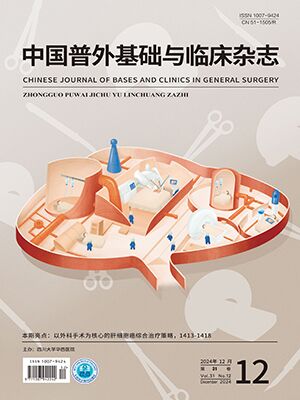Objective To establish perineural invasion xenograft model of hilar cholangiocarcinoma.
Methods The cultured cells of cholangiocarcinoma cell line QBC939 were inoculated subcutaneously in the nude mice so as to
establish primary subcutaneous model of cholangiocarcinoma. The primary tumor tissues were inoculated intraperitoneally
around the liver in the nude mice so as to establish the second generation intraperitoneal xenograft model. The successful xenografted tumor tissues were obtained for anatomical and pathological examinations.
Results The tumor formation rate of primary subcutaneous xenograft of hilar cholangiocarcinoma was 100% (5/5), and no nerve infiltration was observed. The tumor formation rate of the second generation intraperitoneal xenograft was 45% (9/20), and two mice (2/9, 22%) manifested nerve infiltration. The rate of nerve infiltration was 10% (2/20), and the tumor cells had different size and diversity, irregular shape, low differentiation, decreased cytoplasm and nucleus karyomegaly, visible atypical and fission phase, and no obvious gland tube structure by pathological examination.
Conclusions Hilar cholangiocarcinoma cell has the particular features of perineural invasion, it is a good experiment platform for researching the mode and biological characteristics of perineural invasion of hilar cholangiocarcinoma by applicated QBC939 cell lines to establish the perineural invasion xenograft model of cholangiocarcinoma.
Citation: LI Zhenkai,ZHANG Bingyuan,DAI Dongdong,GAO Yuan,ZHANG Xianxiang,HU Jilin,LU Yun. Establishment of Animal Models of Hilar Cholangiocarcinoma with Perineural Invasion. CHINESE JOURNAL OF BASES AND CLINICS IN GENERAL SURGERY, 2013, 20(5): 487-491. doi: Copy
Copyright © the editorial department of CHINESE JOURNAL OF BASES AND CLINICS IN GENERAL SURGERY of West China Medical Publisher. All rights reserved
-
Next Article
从汶川至芦山:地震医疗救援投入产出效益评估




